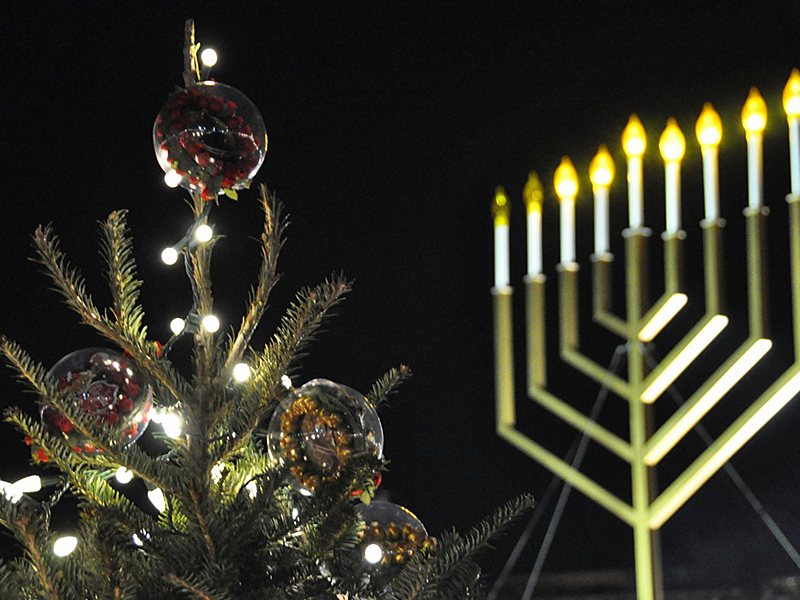Does nostalgia tint our vision and memory with warmth and joy? Perhaps. But try as I might, I cannot remember anything but happiness growing up in the 1960s in Britain with a Jewish dad and a non-Jewish mother when Christmas came around.
A mezuzah on the door, and a Christmas tree in the front room
I was raised without any religion, but with a certain if limited Jewish cultural identity. I was always far more British than Jewish and, in a way, by implication more Anglican than Jewish. We had a mezuzah on the door and, come December, a Christmas tree in the front room. Mind you, it was only a medium-sized tree, and we brought it down from the attic every year, unfolded its cheap, tinsel branches and hung ornaments on it. No crosses, no Jesus, no crèche, no Virgin Mary. That would be have been inconceivable, even by immaculate standards.
I remember the Salvation Army coming to the door one year and singing carols. Suddenly they stopped, and we heard a man explaining to his uniformed choir that it might be rude to sing about Jesus outside a house where, as he had noticed from the mezuzah, a Jewish family lived. It was so delicately and sensitively put. Not political correctness, but Christian charity. My dad ran to the door, asked them to please continue singing, and then put as much money as he could in their collection tin.
My parents would no more have gone to church than to synagogue, at least at any time that didn’t involve a wedding or a funeral. Yet dad never worked Yom Kippur. He was a London cab driver at a time when around one-third of all of the black cabs in the city were driven by Jewish men. If he’d been seen working by non-Jewish cabbies on the Day of Atonement, they would have been shocked and told their Jewish friends when they returned to work.
The only other time dad didn’t work was Christmas Day, which was always to be spent with the family. So Phil Coren worked until 2 a.m. on Christmas Eve to try to make up for the money he lost by not working the following day. It wasn’t because he was mean with money – far from it – but because he supported a family of four on his single income, and we were not wealthy by any means. Thank God for public education, the National Health Service and British social democracy.
READ: Understanding my father’s opposition to intermarriage
What has always hurt me is that I didn’t realize the reality of it all. I would wake up at seven in the morning on Christmas Day, see the sack of presents at the end of my bed and rush to my parents’ bedroom screaming, “He’s been, he’s been!”
I could never understand why my dad seemed so tired, so lacking in interest. The poor man had had five hours sleep after a 16-hour working day so as to buy what “He” who had “been” had left me. I wish Dad was here now, so I could tell him that I was so, so grateful to him for it.
Christmas Day was Frosty the Snowman and Rudolph the Red-Nosed Reindeer on television – no videos then – followed by a big lunch and then family visits in the evening. Mum’s parents gave me more gifts, Dad’s parents didn’t – they were the children of east European immigrants and Christmas to them was still something alien. I should have been more understanding of all that, but, truth be told, I resented them for it.
I loved the carols, I loved the sense of goodwill to all, I loved the vague ideas I had of the Christmas story of magic made flesh. I loved the whole thing. But most of all, I loved my mixed marriage parents, who showed me the joy of Christmas.
Michael Coren is an author and broadcaster. He can be reached at [email protected].
